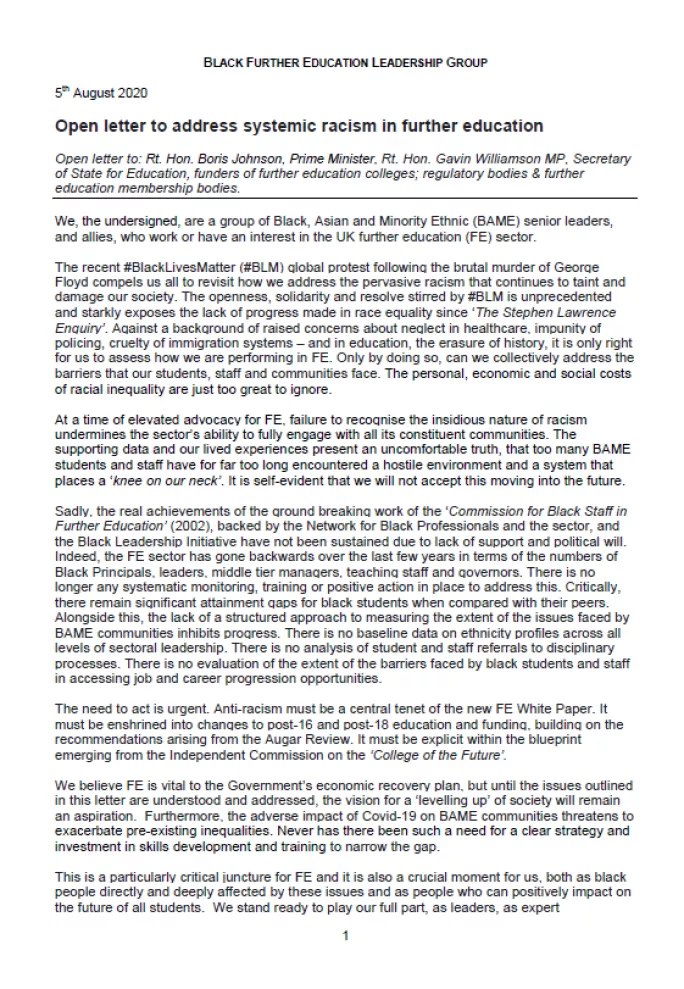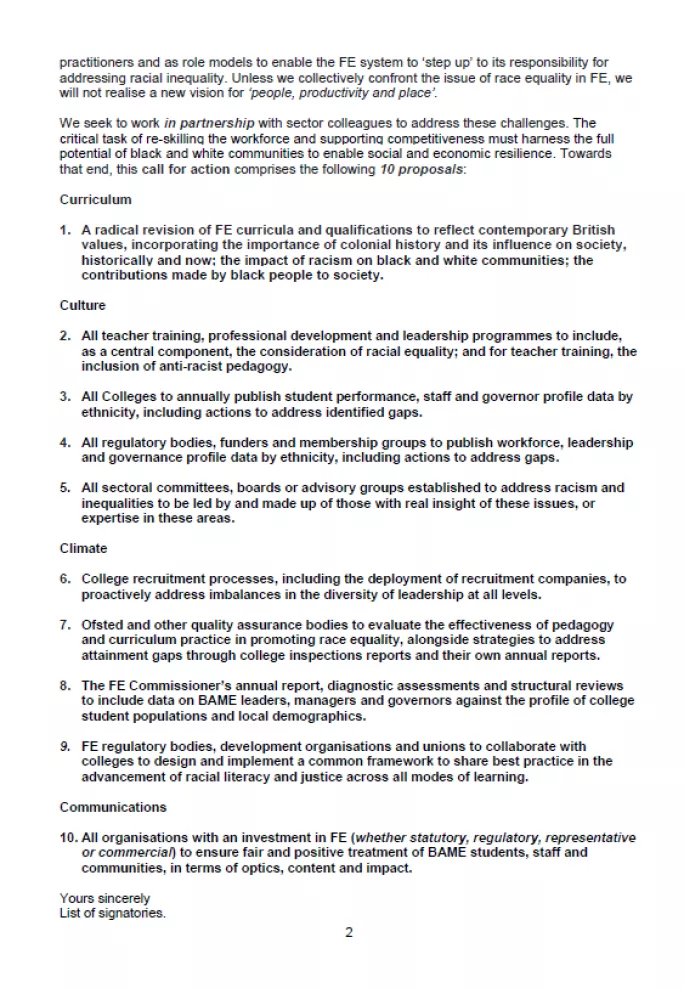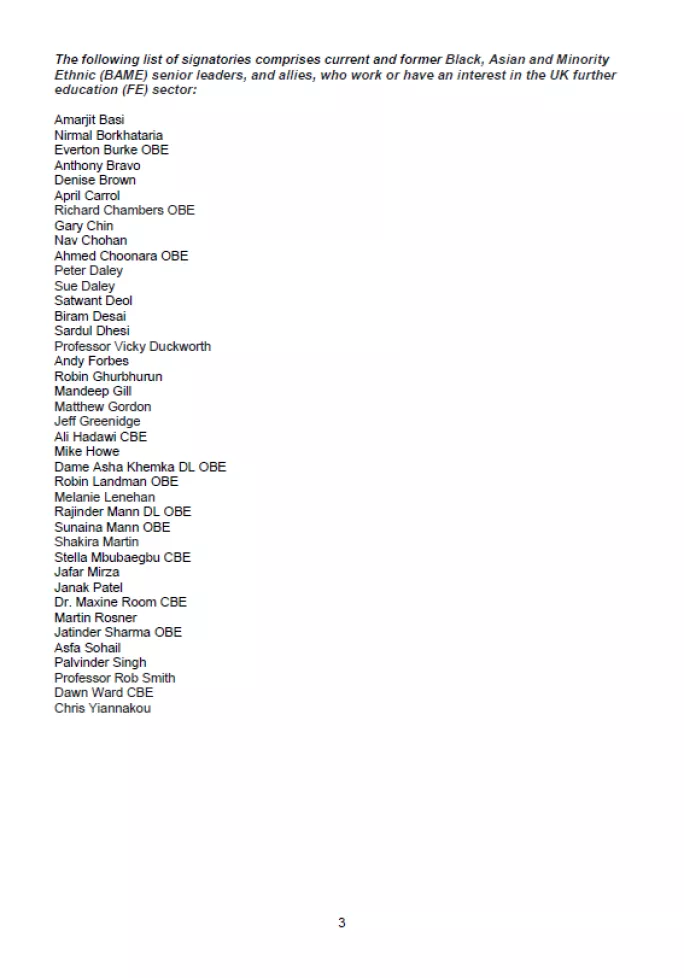- Home
- Racism ‘undermines’ FE, government told
Racism ‘undermines’ FE, government told

Racism in further education is undermining the sector’s ability to fully engage with its constituent communities, it has been claimed.
In an open letter to the prime minister Boris Johnson, education secretary Gavin Williamson and funding, regulatory and membership bodies in FE, a group calling itself the Black Further Education Leadership Group says: “At a time of elevated advocacy for FE, failure to recognise the insidious nature of racism undermines the sector’s ability to fully engage with all its constituent communities."
The group, made up of “black, Asian and minority ethnic (BAME) senior leaders, and allies, who work or have an interest in the UK further education (FE) sector”, add: "The supporting data and our lived experiences present an uncomfortable truth, that too many BAME students and staff have for far too long encountered a hostile environment and a system that places a ‘knee on our neck’. It is self-evident that we will not accept this moving into the future.”
Revealed: FE’s lack of diversity in leadership
Opinion: 'We have a long way to go'
Background: Train new recruits in anti-racism, say teachers
The letter, which has 40 signatories, goes on to say: “We believe FE is vital to the government’s economic recovery plan, but until the issues outlined in this letter are understood and addressed, the vision for a ‘levelling up’ of society will remain an aspiration.
Tackling racism in FE
“Furthermore, the adverse impact of Covid-19 on BAME communities threatens to exacerbate pre-existing inequalities. Never has there been such a need for a clear strategy and investment in skills development and training to narrow the gap.”
Robin Landman, a former FE leader and one of the organisers of the letter, said that, since 2010, there had been a "steady drop" in the number of BAME leaders. He added that the signatories were using this opportunity to highlight "an agenda item that has been filed away as 'too difficult to do'".
The letter comes after Tes revealed last week that 84.1 per cent of senior leaders in English colleges identified as white British. According to information obtained through a freedom of information request, just 8.7 per cent identify as being from a black, Asian and/or minority ethnic (BAME) background.
Association of Colleges chief executive David Hughes said the letter raised vital questions and concerns that “need to be addressed urgently”.
“Like other parts of society, there is a diversity deficit in leadership, and FE is sadly no exception. It should not just be on black leaders to fix the issues of societal racism. It is on us all," he said.
"We have been acting on this over the last year by establishing an equality and diversity steering group, working on a diversity charter and action plan, improving our recruitment and training offer, and working with other organisations and the Department for Education to drive forward real, meaningful and lasting change. We are also challenging ourselves to do better and be better at the AoC, going through the same processes we are asking the sector to go through.
“More needs to be done to support the black leaders we have, as well as encouraging and supporting the black leaders of the future. More also needs to be done to understand the experience, achievement and progression of black students in FE.
"As a leading sector body, AoC stands with the leaders who have written this letter. I and my team are ready to work in partnership, secure resources, and take actions which will improve the lived experiences of staff and students in colleges, now and in the future.”
The open letter makes a number of recommendations:
1. A radical revision of FE curricula and qualifications to reflect contemporary British values, incorporating the importance of colonial history and its influence on society, historically and now; the impact of racism on black and white communities; and the contributions made by black people to society.
2. All teacher training, professional development and leadership programmes to include, as a central component, the consideration of racial equality; and for teacher training, the inclusion of anti-racist pedagogy.
3. All colleges to annually publish student performance, staff and governor profile data by ethnicity, including actions to address identified gaps.
4. All regulatory bodies, funders and membership groups to publish workforce, leadership and governance profile data by ethnicity, including actions to address gaps.
5. All sectoral committees, boards or advisory groups established to address racism and inequalities to be led by and made up of those with real insight of these issues, or expertise in these areas.
6. College recruitment processes, including the deployment of recruitment companies, to proactively address imbalances in the diversity of leadership at all levels.
7. Ofsted and other quality assurance bodies to evaluate the effectiveness of pedagogy and curriculum practice in promoting race equality, alongside strategies to address attainment gaps through college inspection reports and their own annual reports.
8. The FE commissioner’s annual report, diagnostic assessments and structural reviews to include data on BAME leaders, managers and governors against the profile of college student populations and local demographics.
9. FE regulatory bodies, development organisations and unions to collaborate with colleges to design and implement a common framework to share best practice in the advancement of racial literacy and justice across all modes of learning.
10. All organisations with an investment in FE (whether statutory, regulatory, representative or commercial) to ensure fair and positive treatment of BAME students, staff and communities, in terms of optics, content and impact.
The letter in full



Keep reading for just £1 per month
You've reached your limit of free articles this month. Subscribe for £1 per month for three months and get:
- Unlimited access to all Tes magazine content
- Exclusive subscriber-only stories
- Award-winning email newsletters



